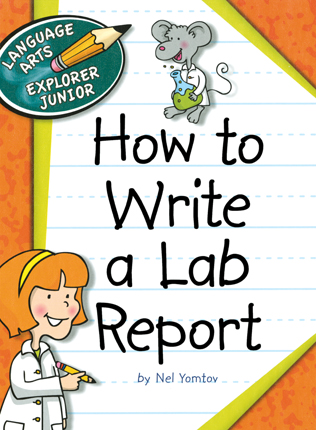| How to write a lab report (Language arts explorer junior) Author: Yomtov, Nelson | ||
| Price: $6.50 | ||
Summary:
Explains how to plan and write lab reports.
| Accelerated Reader Information: Interest Level: LG Reading Level: 4.60 Points: .5 Quiz: 161316 |
Common Core Standards
Grade 2 → Reading → RI Informational Text → 2.RI Key Ideas & Details
Grade 2 → Reading → RI Informational Text → 2.RI Craft & Structure
Grade 2 → Reading → RI Informational Text → Texts Illustrating the Complexity, Quality, & Rang
Grade 2 → Reading → CCR College & Career Readiness Anchor Standards fo
Grade 2 → Reading → RI Informational Text → 2.RI Integration of Knowledge & Ideas
Grade 3 → Reading → RI Informational Text → 3.RI Key Ideas & Details
Grade 3 → Reading → RI Informational Text → 3.RI Craft & Structure
Grade 3 → Reading → RI Informational Text → 3.RI Integration of Knowledge & Ideas
Grade 3 → Reading → RI Informational Text → Texts Illustrating Complexity, Quality, & Range of
Grade 3 → Reading → CCR College & Career Readiness Anchor Standards fo
Grade 4 → Reading → RI Informational Text → 4.RI Key Ideas & Details
Grade 4 → Reading → RI Informational Text → Texts Illustrating the Complexity, Quality, & Rang
Grade 4 → Reading → CCR College & Career Readiness Anchor Standards fo
Grade 4 → Reading → RI Informational Text → 4.RI Craft & Structure
Reviews:
School Library Journal (02/01/14)
Full Text Reviews:
School Library Journal - 02/01/2014 Gr 3–5—These books provide step-by-step instructions for various types of writing. Each one defines the topic, offers suggestions on how to begin thinking about the writing task, suggests several activities with simple charts to help organize thoughts, and includes a sample of a final product. For example, Fractured Fairy Tale provides an organizer that has children list the name of the original tale with the names of the characters, plot, settings, problem, and conclusion, and then make a chart for their story showing the changes in these elements. The next step of writing the tale will come easily once the organizer is completed. Lab Report discusses the components of the scientific method (make an observation, ask a question, form a hypothesis, conduct an experiment, and accept or reject the hypothesis). Memoir suggests first making a list of favorite memories. The photos include a diverse representation of children (some seem too young for the writing task) but do not add much to the presentations; the activities, clearly written texts, and charts are the stars of these books. Classroom and special-education teachers will find these titles valuable. This is a 24-volume series, so educators who don't plan to teach the writing skills covered in these books may want to check out the other titles.—Stephanie Farnlacher, Trace Crossings Elementary School, Hoover, AL - Copyright 2014 Publishers Weekly, Library Journal and/or School Library Journal used with permission.



